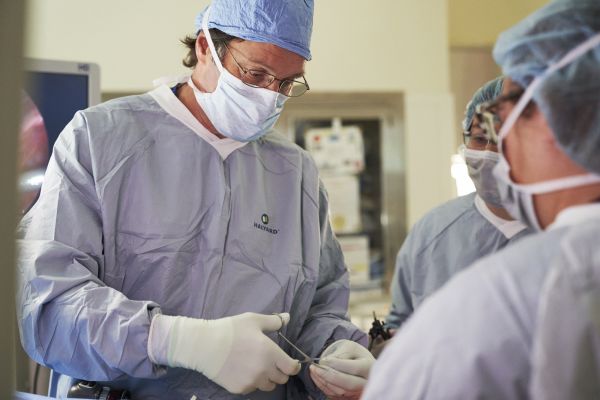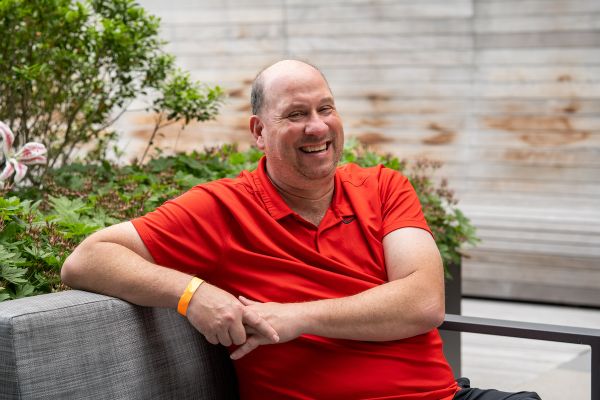Vague but ongoing tummy issues need to be checked out
Like many cancer types, stomach cancer develops slowly over several years. But the early changes that occur first and that may lead to cancer rarely cause symptoms, so they often go undetected. As a result, most cases are not diagnosed until the cancer has already spread beyond the stomach to nearby lymph nodes and tissues as well as distant body areas, making treatment challenging.
"In the United States, and here at Roswell Park, a lot of patients have cancer that occurs at the junction of the stomach and esophagus, called the GE junction," says gastroenterologist Kevin Robillard, MD, of Roswell Park Comprehensive Cancer Center. Cancer in the GE junction is often associated with a history of acid reflux, which can cause Barrett’s Esophagus, a precancerous condition. Those who have been on acid reflux medications for months or years should be monitored for this condition.
It’s important that people with acid reflux or those with a family history of stomach cancer be alert to any new stomach symptoms and address them as soon as possible.
Symptoms to alert your doctor
Cancers can start in different sections of the stomach, and each can cause different symptoms and have different treatments. Every patient may present a little differently, but some of the common symptoms include unexplained weight loss, difficulty swallowing and sometimes blood in the stool.
Unintentional weight loss should raise a red flag, especially if you have a family history of stomach cancer. Some minority populations, such as Asian/Pacific individuals, have a higher incidence of stomach cancer and should be extra cautious and see their doctor. The weight loss may come about as a result of other symptoms such as abdominal pain, fullness of the stomach, or loss of appetite and nausea. The abdominal pain, typically in the upper abdomen, is usually kind of a vague pain, and becomes more severe when the cancer is more advanced.
Difficulty swallowing, called dysphagia, can be another common symptom. At first, it might not seem like a problem. But, it can progress from problems with swallowing solids to having trouble with softer or even pureed foods and liquids.
A person might not notice blood in their stool because it is usually hidden or occult bleeding. Patients usually don’t notice it, but they can keep losing blood and can become anemic. Sometimes a patient may see overt bleeding. The stool color changes to a mostly black, tarry color, though that is uncommon.
If the cancer metastasizes, symptoms may appear related to those areas, such as enlarged liver or lymph nodes. The cancer also tends to spread to the peritoneum, a membrane inside the abdomen. Symptoms of this include distention of the abdomen, pain and a slowing down or obstruction of the bowels. Any stomach pain that lasts for more than a few weeks, or keeps coming back, should be checked out. Finally, if you experience blood in the stool or vomit, don’t delay. See a doctor immediately.
Get a second opinion
It’s important to seek a second opinion before treatment begins to ensure your diagnosis is correct and your treatment options are appropriate.
Seeking quality cancer care
Although a fecal occult blood test is used to screen for colorectal cancer, it is not used for gastric cancer screening. But if blood is detected with a fecal occult blood test, it does not automatically mean colon cancer. Your physician will need to investigate further to determine the cause of the blood.
An upper GI endoscopy is the next step in diagnosis, and then a CT scan is used to look for cancer spread, especially to the peritoneum. "In patients where this has occurred, there may be an option to treat with a specialized procedure called cytoreductive surgery and HIPEC," says Dr. Patel. Roswell Park is one of few providers able to offer this treatment approach known as hyperthermic intraperitoneal chemotherapy (HIPEC), which infuses high doses of heated chemotherapy directly to the abdomen.
There are several reasons for patients to seek stomach cancer treatment at Roswell Park, explains Dr. Robillard. “We have screening expertise, especially when there is a family history, and you may benefit from our genetic screening. Second, when diagnosed very early, we have interventional endoscopists with special skills and training to remove it. Third, if you need surgery, you want a center that performs these surgeries frequently, and our surgeons have more experience than many other centers. Finally, Roswell Park is an academic research center. I always recommend patients being treated at a community hospital receive a second opinion here, because you may have an opportunity to participate in a trial which can allow you to access treatment options you can’t get elsewhere.”





